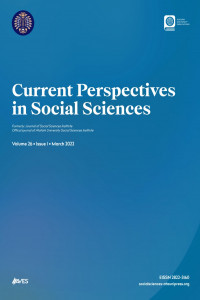Assessing the Impacts of Opportunity Cost-Related Regret on Experiential Value and Revisit Intention in a Restaurant Setting
financial constraints, opportunity cost-related regret, restaurant, revisit intention, Experiential value
___
- Andersson, T. D., & Mossberg, L. (2004). The dining experience: Do restaurants satisfy customer needs? Food Service Technology, 4(4), 171–177. [CrossRef]
- Becker, S. W., Ronen, J., & Sorter, G. H. (1974). Opportunity costs-an experimental approach. Journal of Accounting Research, 12(2), 317–329. [CrossRef]
- Bui, M., Krishen, A. S., & Bates, K. (2011). Modeling regret effects on consumer post‐purchase decisions. European Journal of Marketing, 45(7/8), 1068–1090. [CrossRef]
- Chang, Y. P., Gao, Y., & Zhu, D. H. (2015). The impact of product regret on repurchase intention. Social Behavior and Personality: An International Journal, 43(8), 1347–1360. [CrossRef]
- Chen, H. B., Yeh, S. S., & Huan, T. C. (2014). Nostalgic emotion, experiential value, brand image, and consumption intentions of customers of nostalgicthemed restaurants. Journal of Business Research, 67(3), 354–360. [CrossRef]
- Haghpour, B., Sahabeh, E., & Halvari, H. (2022). Opportunity cost in consumer behavior: Definitions, operationalizations, and ambiguities. International Journal of Consumer Studies, 46(5), 1942–1959. [CrossRef]
- Han, W., Jiang, W., Tang, J., Raab, C., & Krishen, A. (2022). Indirect customer-to-customer interactions and experiential value: Examining solo and social diners. International Journal of Contemporary Hospitality Management, 34(5), 1668–1691. [CrossRef]
- He, Z., Wu, L., & Li, X. R. (2018). When art meets tech: The role of augmented reality in enhancing museum experiences and purchase intentions. Tourism Management, 68, 127–139. [CrossRef]
- Holbrook, M. B. (1994). The nature of customer value: An axiology of services in the consumption experience. Service Quality, 21(1), 21–71.
- Holbrook, M. B. (1999). Introduction to consumer value. Consumer Value: A Framework for Analysis and Research, 1–28.
- Holbrook, M. B., & Hirschman, E. C. (1982). The experiential aspects of consumption: Consumer fantasies, feelings, and fun. Journal of Consumer Research, 9(2), 132–140. [CrossRef]
- Jin, N., Lee, S., & Huffman, L. (2012). Impact of restaurant experience on brand image and customer loyalty: Moderating role of dining motivation. Journal of Travel and Tourism Marketing, 29(6), 532–551. [CrossRef]
- Başlangıç: 2003
- Yayıncı: Atatürk Üniversitesi
Seçilmiş Makroekonomik Göstergelerin Çevresel Bozulma Üzerindeki Etkisi: BRICS-T Ülkeleri
İnci DURSUN, Ebru TÜMER KABADAYI, Elif ARALIK
Fârâbî’de Felsefe ve Geometri İlgisi
Hükümet Sistemleri Üzerinden Mukayeseli Bir Analiz (Parlamenter Sistem–Başkanlık Sistemi)
Muhammet Yasin ELİTOK, Fatih DEĞİRMENCİ
21’inci Yüzyılda Savaş: Savaşın Dönüşümü ve Yeni Aktörlerin Tipolojisi
The Invisibility of Male Witches in British Culture from the Early Modern Period to Modern Day
McCarthy’s Roots in Tradition and Perception of Nature in The Road
Cinematic Narration in Altın Çocuk and James Bond Differences, Similarities and Geographies
